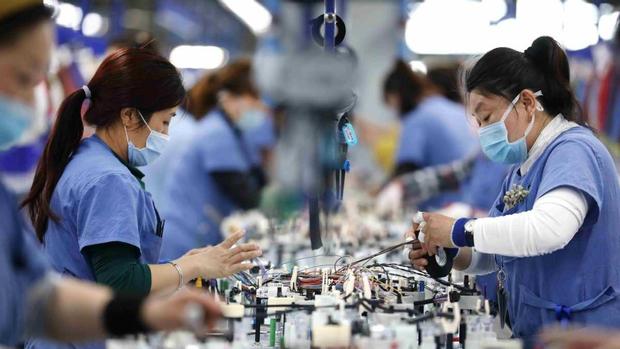 This undated photo shows employees making auto parts at a foreign-funded company in Anshan, Liaoning province. (PHOTO / XINHUA)
This undated photo shows employees making auto parts at a foreign-funded company in Anshan, Liaoning province. (PHOTO / XINHUA)
BEIJING - Foreign investor confidence in China's prospects continued to strengthen as the economy maintains restorative growth momentum, which drove up investment inflow in the first two months of 2021, a Ministry of Commerce (MOC) spokesperson said on Thursday.
In particular, foreign investment in high-tech industries registered notable growth as China accelerates its construction of the new "dual circulation" development paradigm, said Gao Feng, spokesperson for the Ministry of Commerce
In particular, foreign investment in high-tech industries registered notable growth as China accelerates its construction of a new development paradigm, said Gao Feng. The new development paradigm refers to "dual circulation", in which domestic and overseas markets reinforce each other, with the domestic market as the mainstay.
ALSO READ: Attracting more high-quality foreign investment crucial task
He said that industries hit hard by the COVID-19 pandemic last year, including the hotel and catering sectors as well as wholesale and retail trade, saw a quick rebound.
Foreign direct investment (FDI) into the Chinese mainland, in actual use, expanded 31.5 percent year-on-year to 176.76 billion yuan in the first two months, earlier MOC data showed.
In US dollar terms, FDI inflow rose 34.2 percent year on year to US$26.07 billion.
Foreign investment in the services industry came in at 141.74 billion yuan (US$21.78 billion during the period, up 48.7 percent year-on-year.
FDI into the Chinese mainland, in actual use, expanded 6.2 percent year on year to a record high of 999.98 billion yuan in 2020.
Security review to guarantee healthy economic growth
Rules for foreign investment security reviews will not add unnecessary burdens to normal foreign investors and enterprises, but are conducive to the development of foreign-funded businesses in China in the long term, Gao said.
The rules fine-tune China's foreign investment security review system in accordance with the requirements of the foreign investment law and relevant regulations, he said.
Conducting security reviews on foreign investments is a regular international practice, said Gao
Gao said that the rules are a necessary guarantee for the stable and healthy development of China's economy and further opening-up to the outside world.
READ MORE: UN report: China largest recipient of FDI in 2020
Under the rules, foreign investment in the military industry and relevant sectors pertaining to national security, as well as in surrounding areas of military infrastructure, should be reviewed, Gao said.
Foreign investment in nine sectors concerning national security, including vital agricultural products, energy and resources, should also be reviewed when foreign investors have control over the enterprises in which they invest, the spokesperson added.
Conducting security reviews on foreign investments is a regular international practice, Gao said.
Chinese authorities released rules for foreign investment security reviews at the end of last year. The rules came into effect in January.
ODI down 7.9% in first 2 months
China's non-financial outbound direct investment (ODI) went down 7.9 percent year-on-year in the first two months of 2021, official data showed.
The ODI amounted to 99.38 billion yuan (about US$15.36 billion) in that period, according to MOC.
China's non-financial outbound direct investment (ODI) went down 7.9 percent year-on-year in the first two months of 2021 to 99.38 billion yuan (about US$15.36 billion), according to official data
Investment into Belt and Road Initiative partner countries increased 12.1 percent year-on-year to reach US$3.05 billion, accounting for 19.9 percent of the total ODI during the period. The proportion expanded 2.4 percentage points from the same period last year.
Outbound investment flowing into the manufacturing industry and information transmission industry posted robust growth in the first two months, the data showed.
ODI from China's local enterprises reached US$11.86 billion, up 3.2 percent year-on-year, accounting for 77.2 percent of the total ODI in the period.
The contract value of newly signed overseas projects dropped 7.8 percent year-on-year to US$30.63 billion, according to the data.


